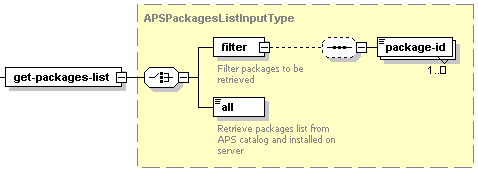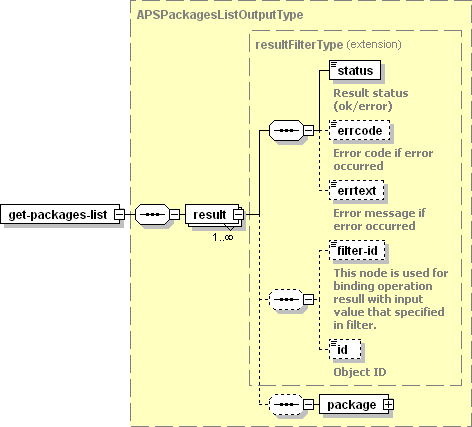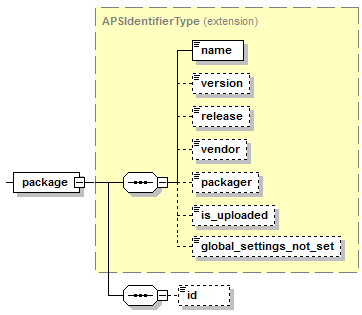Retrieving Available Packages
The get-packages-list operation is used to retrieve information on application packages available for installation on domains/subdomains.
Request Packet Structure
A request XML package that retrieves the list of applications available for installation on domains/subdomains should include the get-packages-list operation node:
<packet>
<aps>
<get-packages-list>
...
</get-packages-list>
</aps>
</packet>
The get-packages-list node is structured as follows:

Note: The interactive schema navigator for all request packets is available here: http://plesk.github.io/api-schemas/1.6.9.1/agent_input.svg.
-
filter, required
Filters the packages whose information should be retrieved. Data type: none.
If specified empty, then information on all APS Packages available on the server will be returned in response packet.
-
package-id, optional
Specifies the ID of a package whose information should be retrieved. Data type: id_type (
common.xsd). -
all, required
Retrieves the list of applications from APS catalog and applications installed on the server.
Response Packet Structure
The get-packages-list node of the output XML packet is structured as follows:

Note: The interactive schema navigator for all response packets is available here: http://plesk.github.io/api-schemas/1.6.9.1/agent_output.svg.
-
result, required
Wraps the response retrieved from the server. Data type: resultType (
common.xsd). -
status, required
Specifies the execution status of the operation. Data type: string. Allowed values: ok | error.
-
errcode, required if the operation fails
Returns the error code. Data type: integer.
-
errtext, required if the operation fails
Returns the error message. Data type: string.
-
filter-id, required if the operation succeeds
Returns the package ID by which the operation was filtered. Data type: any.
-
id, optional
Not returned.
-
package, required if the operation succeeds
Holds a collection of data describing the package. Data type: APSIdentifierType (
aps.xsd).Structured as follows:
-
name, required
Specifies the application package name. Data type: string.
-
version, optional
Specifies the application version.Data type: string.
-
release, optional
Specifies the package release.Data type: string.
-
vendor, optional
Specifies the application vendor. Data type: string.
-
packager, optional
Specifies the application packager. Data type: string
-
is_uploaded, optional
Specifies whether a package is uploaded to the server manually by the Administrator (not from Application Catalog). Data type: string
-
is_visible, optional
Specifies if a package is visible to customers and resellers. Data type: string
-
global_settings_not_set, optional Specifies whether the application has global settings that require configuration. Data type: string
-
id, required
Specifies the ID of the package assigned to it on the server. Data type: id_type (
common.xsd).
Retrieving information on all APS packages
This packet retrieves information on all APS packages.
<packet>
<aps>
<get-packages-list>
<filter/>
</get-packages-list>
</aps>
</packet>
Response A
Positive response received from server can look as follows:
<packet>
<aps>
<get-packages-list>
<result>
<status>ok</status>
<filter-id>1</filter-id>
<package>
<name>typo3</name>
<version>4.4.2</version>
<release>5</release>
<vendor>http://typo3.org/</vendor>
<packager>http://odin.com/</packager>
<is_uploaded>0</is_uploaded>
<is_visible>0</is_visible>
<global_settings_not_set>0</global_settings_not_set>
<id>1</id>
</package>
</result>
</get-packages-list>
</aps>
</packet>
Response B
Such response is received in case when no APS packages are yet on the server:
<packet>
<aps>
<get-packages-list>
<result>
<status>ok</status>
</result>
</get-packages-list>
</aps>
</packet>
Retrieving information on particular APS packages
This packet retrieves information on APS packages with IDs 12 and 13.
<packet>
<aps>
<get-packages-list>
<filter>
<package-id>12</package-id>
<package-id>13</package-id>
</filter>
</get-packages-list>
</aps>
</packet>
Such negative response is received if the package with requested ID does not exist:
<packet>
<aps>
<get-packages-list>
<result>
<status>error</status>
<errcode>1013</errcode>
<errtext>Package does not exist</errtext>
<filter-id>12</filter-id>
</result>
<result>
<status>error</status>
<errcode>1013</errcode>
<errtext>Package does not exist</errtext>
<filter-id>13</filter-id>
</result>
</get-packages-list>
</aps>
</packet>
